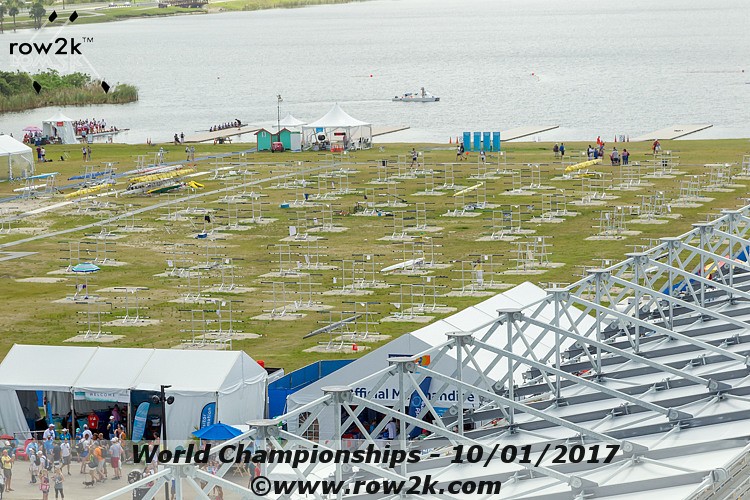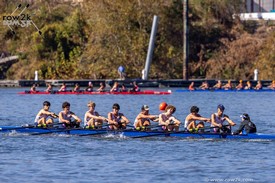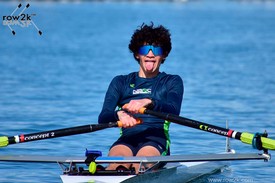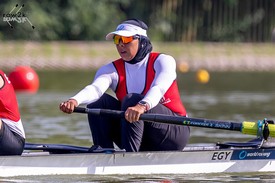
Six to eight weeks.
That is about how long before your next scheduled race you will know if the race will actually take place, or instead will be cancelled or postponed.
Before the decision to cancel all remaining international regattas for 2020, FISA was operating from an "eight weeks out" approach, as noted in a release on March 26: "Given the containment measures taken against the spread of COVID-19, the current thinking is that the deadline for critical decisions on international events is two months to go."
A separate release noted that the minimum time for equipment that had to be shipped on containers was seven weeks, so even before figuring out whether athletes could train, hotels would be operational, and more, the fact was that even to have boats and oars in place required two months.
Cancelling - or not cancelling - a regatta is probably the toughest decision any regatta organizer faces, at least on a regular basis (typically due to weather concerns). The pressure to make the "right" decision is immense, and we have all seen hindsight cut both ways - if a regatta is not cancelled and conditions worsen, complaints and "should have" commentary can be nearly deafening - and if a regatta is cancelled and conditions turn out not to be too bad, the clamor is often even worse.
And that is under so-called "normal" conditions, forget right in the midst of a global pandemic.
row2k spoke with four experienced event managers about the decision process and timelines involved in confirming or cancelling regattas this summer - Kris Grudt of the PNRA, Brett Johnson of USRowing (who also piloted the Sarasota venue for two years), Bill Schenck of the Canadian Henley, and Jim Rogers at Oak Ridge RA - here is what they had to say.
Safety
To look at "safety first," this is obviously the top priority of most regatta directors, who need to ensure the safety of athletes, officials, volunteers, support staff, attendees, vendors - really everyone involved.
"The safety of the competitors is always the first consideration," Grudt said, noting that this applies across all regatta considerations, not just COVID-19 concerns. "But it's really everyone involved, and what might work for one group might not be the best thing for everyone, and we have to do what is best for all participants. It is always the most difficult thing as a regatta director to try to determine when you can have safe, fair, meaningful racing, on and off the water."
But safety considerations during - and notably, after - the current pandemic become complicated quickly.
"We rely on trained professionals for safety on the water," Schenck notes. "First responders up here, by the time we get to the other side of this, they may be already overworked because they're being asked to work a lot of hours, and it's not clear they will have the energy or ability to take time off work to come and volunteer at an event."
The Complications of Planning Large Gatherings
Regattas are often very large events, and it is easy to imagine the first post-COVID-19 regattas being extremely heavily subscribed. While the return of the rowing community to racing and gathering is an extremely heartening prospect, this may in fact present the most uncertain element in play.
This challenge is exacerbated by varying regulations across geographical areas, Johnson noted (USRowing has cancelled all events through mid-June; the next USRowing event still on the calendar are two Masters regionals in GA and WA on the last weekend of June, followed by the National Championships July 14-19 on the Cooper River, and Masters Nationals Aug 13-16 in Oakland CA).
"The first requirement is to follow the guidelines of the local health officials," Johnson said. "So whatever the venue is, the first thing we look at is, what are the local guidelines? What are the state guidelines? What is that you're capable of doing?"
"Moving forward there may be certain areas, where you would be able to host something, where in other areas you couldn't."
In particular, Johnson cited varying guidelines for the permitted size of gatherings.
"There will be some locations where people are ready to get back on the water, but you might not be able to hold an event because that area isn't able to start hosting larger groups. Generally speaking, it seems like you'll be able to bring things back gradually, but it might be that groups as big as the size of a regatta will not be the first thing to come back."
It might be that the return to normal will be a slow-motion mirror image of the first days of the pandemic, where recommendations started at keeping groups at sporting events under 1000, then maybe only allowing the family members of competitors, then within hours the number dropped to 250, then 100, then 10, then the sporting world largely ceased, all in a matter of days. This process could reverse itself with very similar benchmarks, but more likely over a period of weeks or months, and certainly not days.
International Concerns
The Canadian Henley has a unique role in the North American regatta calendar in that it not only marks the end of the spring and summer racing season for many athletes and clubs, so is often heavily subscribed, but also more critically at this time, involves extensive travel, movement of equipment, and, significantly, border crossings.
According to Schenck, in most years 60% of entries come from the United States.
At present the Canadian border is closed to all but essential commerce, and no timeline is set for reopening the border at this writing.
Further, a closed border is the least of it; effective March 25, all travelers returning to Canada are subject to a mandatory 14-day quarantine.
Schenck, who is also a member of the FISA Events Commission that decided this week to cancel all remaining FISA events, noted that even if you feel you are able to move forward with an event, simply getting to the regatta is not certain.
"Even if you want to come, you can't come across the border at this point in time," Schenck said. "You can't travel between (Canadian) provinces without having to go through checkpoints. All travel at this point, including airfares, is very limited."
Logistics
From there, logistical challenges start to fan out quickly.
There are fairly urgent "people" concerns, without question - the availability and comfort level of the large numbers of volunteers that big events require; the vulnerability of certain populations within the rowing community, including the ref corps; faded or out-of-position infrastructure at shuttered venues; even the issue of whether employees of any association or venue are still on staff.

Then there are all the supporting businesses and individuals that provide services to regattas, including lodging, car rentals, and more.
Schenck noted that most businesses in Canada are closed, including the local restaurants, hotels, and even big box stores that are still open in the US are shut down.
"We've had quite a few the hotels shut down, because there's no one using the hotels," he said. All of the restaurants are closed, Home Depot and Canadian Tire - everything's closed here now."
The infrastructure demands of running a regatta are fairly varied: portajohns, golf carts, gas for launches, tents, parking lot setup, WIFI, electrical wiring, vendor support items, bow markers, dock maintenance, PA systems - the list goes on.
Grudt notes that many event organizers do have close relations with local service providers, so could probably rally on fairly short notice.
"Most of the contracts do have some escape clause timing that you need to meet, but if you have a good working relationship with the different vendors, they can be a little more flexible - and in this case, we're together in looking forward to getting back to business."
Racecourses
For example, many racecourses have either been taken out or were never installed. We have seen course installers make this happen on very short notice, but it is not a trivial endeavor, as Jim Rogers of Oak Ridge notes.
Oak Ridge rescheduled the Dogwood Junior Regatta from April to late June in hopes of providing teams in the region (and beyond) with a "feeder" race ahead of USRowing's National Championship.
"The biggest logistical item is the race course," he said. "We removed the course after the Louisville Cardinal Invitational Regatta was forced to cancel, and would not reinstall the course until two weeks prior. That is a lot of work, requiring more than a hundred volunteer hours, all on-water, to reinstall lane lines and buoys, and get the course appropriately tensioned."
Of course, that depends on whether you are allowed even to go to the racecourse. Mercer Lake has been closed to most uses for a while, and this week New Jersey Governor Phil Murphy closed all state and county parks to all uses.

"Right now, Mercer Lake is closed for all activities, and of course the park is closed," Grudt said. "We don't know how long that is going to last, and when it opens we have to balance that with the teams' planning. Many are coming from afar; they have flights and other planning considerations."
Johnson added that control of any given venue varies, with some private venues, others run by differing institutions (a university, for example), and others run by county or state agencies.
"And this time, there is another big factor," Grudt added. "Is anybody able to train?"
Club Considerations
Many of us assume that once racing resumes, everyone will rush to the soonest and nearest starting line, but the realities of athlete and club finances are becoming a concern.
"Many clubs have lost a lot of the funds that they would operate on through athlete registration and programs, and some have expressed concerns that they may not be able to recover quickly financially," Schenk noted. "If they do get back on the water on the 1st of July, is four weeks enough that they could start racing and participate in Henley?"
Possible Changes to Events
Most of the people we spoke to could envision significant changes to whatever regattas could take place, including both expansion and contraction of events on offer, date changes, venue changes, and more.
Domestic events in particular could see changes; or in the case of the Canadian Henley, the feasibility of running the event with only Canadian entries may be discussed; Schenck mentioned he has even heard inquiries about running a singles-only event.
- Postponing events if conditions look promising for a later date
- Moving to different venues if a specific venue or region is unable to host a regatta
- Addition of categories and boat classes to give more people a chance to race; this could also include adding elite events to nominally "club" regattas to give elite athletes some kind of racing opportunity
- Conversely, significant downsizing to comply with permitted "head count" limits
- Having a singles-only regatta
- You name it
"To try and guess at this point in time what's possible and what isn't is very difficult; but yes, we will look at all options," Schenk said.
"These are all things we have to take into consideration," Johnson said. "Maybe social distancing in smaller groups is possible, but the larger groups aren't. We don't want to cancel things too early because we want to see how things progress, but we also want to be cognizant of everybody having to make plans."

Staying Hopeful
Schenck said that Canadian Henley committee members are using a similar metric to the one he worked with on the FISA committee, with an unofficial deadline of June 1 for a decision on the regatta, fully two months out from the start of racing. The next meeting of the regatta committee is April 16, after which Schenck said there may be more information available.
Johnson noted that the mostly domestic entries for their regattas probably gives them a little more time, with flashpoints for decisions probably arriving in the approximately six-to-eight-week timeframe.
"It's not an exact science," Johnson added.
Clubs will also have their own challenges and deadlines for any return to training and competition, which could vary considerably based on local regulations, club and club member finances, and more.
Most event planning groups and committees are in constant contact at this time; USRowing has a daily meeting at 9am to address rapidly changing conditions on all fronts; Canadian Henley principals exchange information regularly, and Schenck is on both FISA and Canada Summer Games committees, so is sharing information widely; the ORRA regatta execs and officials are monitoring health and regulatory issues continuously; and the PNRA (which currently has no official events until fall other than summer camps) is continually assessing various scenarios and options going forward.
Pick-up Racing Rules
In the end, however, we all know that when the time comes, rowers will be ready to race. They might not be in top condition, or technically "race ready," but who among us isn't up for a little dust-up on short notice under less-than-ideal conditions?
We see it all the time with novices racing in the fall, and high schools racing in early March, and thousands of masters just barely able to survive a three-miler cramming into old racing gear every fall. Certainly all of the people posting training-deficient erg scores to the Internet right now is testament to that.
Let's give our next race a new name - maybe call it the Giant National Pickup Race Championship?
If you enjoy and rely on row2k, we need your help to be able to keep doing all this. Though row2k sometimes looks like a big, outside-funded operation, it mainly runs on enthusiasm and grit. Help us keep it coming, thank you! Learn more.
Comments | Log in to comment |
There are no Comments yet
| |
- Bont Rowing
- Calm Waters Rowing
- Concept 2
- Craftsbury Sculling
- The Crew Classic
- CrewLAB
- Croker
- Durham Boat Co.
- Empacher
- Faster Masters
- Filippi
- Fluidesign
- h2row.net
- HUDSON
- Live2Row Studios
- Nielsen-Kellerman
- Oak Ridge RA
- Peinert Boat Works
- Pocock Racing Shells
- Race1 USA
- RowKraft
- Rubini Jewelers
- Vespoli USA
- WinTech Racing
- Bont Rowing
- Calm Waters Rowing
- Concept 2
- Craftsbury Sculling
- The Crew Classic
- CrewLAB
- Croker
- Durham Boat Co.
- Empacher
- Faster Masters
- Filippi
- Fluidesign
- h2row.net
- HUDSON
- Live2Row Studios
- Nielsen-Kellerman
- Oak Ridge RA
- Peinert Boat Works
- Pocock Racing Shells
- Race1 USA
- RowKraft
- Rubini Jewelers
- Vespoli USA
- WinTech Racing

















